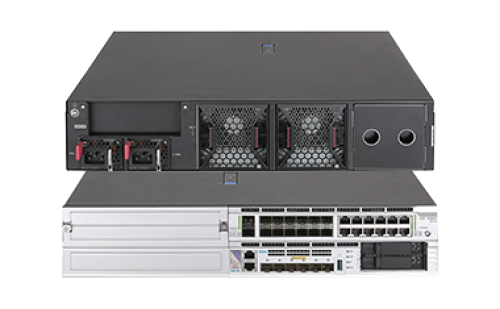
Integrating network, compute, and storage capabilities into a single device, H3C SR6602-I AI-powered ICT converged gateways (hereinafter referred to as SR6602-I) enable rapid service delivery and drive business innovations. Compared with traditional gateway products, the SR6602-I has the following benefits:
IT and CT converged—Combines computing and storage capabilities with Comware 9, a cutting-edge containerized network operating system for the cloud era, simplifying network deployment and lowering the total cost of
Powerful computing resources—Provides an Intel Xeon CPU and two drive slots that support RAID setup, allows large memory expansion, and supports using a GPU to deliver AI computing power.
Open architecture—Provides an open operating system platform on which you can deploy services as VMs and containers and interact with OpenStack cloud computing management platforms and Kubernetes management platforms seamlessly.
The SR6602-I can operate in aggregation or convergence mode. In aggregation mode, it operates as an aggregation router to provide tailored services for carriers, governments, power, finance, education, and enterprise customers. The industry-leading containerized network operating system, brand-new hardware platform, and open and programmable designs define the trend for future IT construction and make it a future-oriented data communication solution that can keep up with diversified business expansions in the future.
The SR6602-I AI-powered ICT converged gateways include two models: SR6602-I and SR6602-IE.
*H3Care CT Foundation Basic 9X5 NBD-Ship Service(1Y)
With the cutting-edge containerized network operating system and powerful computing capability, the router can provide cloud computing and edge computing services in high performance.
Runs Comware 9, a containerized network operating system for the cloud era, which is a truly open, highly efficient network platform capable of building a multiservice all-scenario ecosystem.
Provides professional computing resources, including an Intel Xeon CPU, two external drive slots, and a standard PCIe slot in which you can install a GPU to deliver AI computing power.
Uses an advanced hardware virtualization solution that groups hardware resources including CPU, memory, storage, and interfaces into resources pools to enable flexible and dynamic resource allocation and adjustment based on the actual requirements.
The mechanical and electrical design of the SR6602-I combines high availability of CT devices and easy maintenance of IT devices.
Innovative electromechanical designs allow quick chassis disassembly without using tools, facilitating memory expansion and standard PCIe device installation.
Modular, redundant, and hot swappable designs for components such as power supplies and fan trays and the front-to-rear air aisle make the device highly available and easy to maintain.
Two-drive RAID configuration enhances data availability.
Provide an OpenStack Nova compute component that can interact with OpenStack control nodes for lifecycle management of virtual machines.
Offer Docker and Kubelet functions and support using Docker or Kubernetes technologies to deploy third-party applications on the device as containers.
Support using the AD-WAN solution to achieve rapid WAN deployment, security tunnel establishment, optimal link selection, and traffic visibility.
The SR6602-I provides high-density Ethernet interfaces, OC3/STM-1 channelized POS interfaces, and E1 narrow band access capability in a 2RU footprint.
The SR6602-I comes with twenty 10-GE ports and twelve GE ports and allows you to increase the port quantity to 32 and 28, respectively, to meet the requirements in high-density Ethernet convergence scenarios.
The SR6602-I can provide OC3/STM-1 POS interfaces that can be channelized into E1 interfaces to deliver E1 line rate convergence with the narrowband access capacity, density, and performance all reaching the industry-leading level.
The SR6602-I has a built-in hardware encryption engine that offers industry-leading encryption performance, and allows further enhancement of the encryption capability by installation of standard PCIe devices.
When deployed with the ADVPN solution, the SR6602-I supports dynamic and agile establishment of IPsec tunnels between branch and headquarters (hub-spoke), and between branch and branch (full mesh) across the WAN.
The SR6602-I can be used as an LNS device at the 4G/5G VPDN user side to aggregation data from massive L2TP and GRE tunnels, and use IPsec to encrypt and decrypt tunnel data in high speed.
The SR6602-I delivers rich access control and attack prevention features to provide all-round network security protection for an internal network.
Provides access control based on combinations of username, password, IP address, and MAC address. With the H3C EAD solution, it can provide all-round access control for endpoints, including security check on virus library update, system patch installation, software allowlist and denylist, use of external USB drives, and software and hardware asset information.
Provides firewall features including packet filtering and DoS attack prevention to protect the device from malformed message attacks, flooding attacks, and scanning attacks.
The SR6602-I is designed to provide carrier-grade high availability in hardware and software.
Uses removable power supplies and fan trays, and supports power supply redundancy and hot swapping of power supplies, fan trays, and interface modules.
Provides a lot of high availability software features for rapid service recovery, including:
Hot patch—Enables smooth upgrade of software and ensure service continuity during software upgrade.
Link detection protocols such as BFD and NQA—Allow the upper layer protocol to converge in time when the WAN link fails, shortening the service interruption time.
Fast reroute (FRR)—Collaborates with static routing, policy-based routing, or dynamic routing to achieve fast route switchover upon a link failure.
Virtual Router Redundancy Protocol (VRRP)—Collaborates with BFD to provide fast VRRP switching.
Embedded Automation Architecture (EAA).